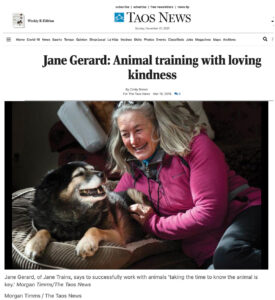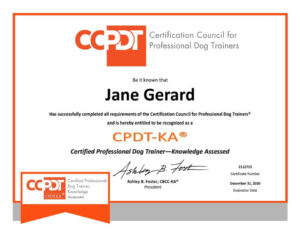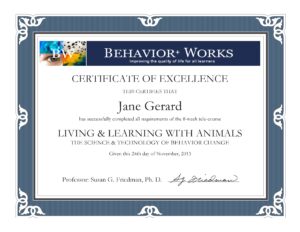
https://www.taosnews.com/magazines/taos-woman/jane-gerard-animal-training-with-loving-kindness/article_521f9ee4-2748-5d00-947e-20087dce18ca.html
For The Taos News Mar 19, 2019
Jane Gerard: Animal training with loving kindness
Jane Gerard, of Jane Trains, says to successfully work with animals ‘taking the time to know the animal is key.’ , Morgan Timms / The Taos News
Animal training is an art form, although it is backed by science, says Taos dog trainer Jane Gerard.
Beginning with her study of horse training with the British Horse Society when she was very young, Gerard has been perfecting her craft for most of her life. She got a summer job training dolphins and sea lions, which evolved into a 17-year career traveling through Europe, the Bahamas, Mexico and New York.
When she was just beginning her career, she had a hard time finding animal training work. “When I started working with dolphins as a young woman, I was turned away from work. There were all men working in the big safari parks with killer whales, dolphins, sea lions and elephants. The concern was that women were too emotional, so they couldn’t train. Actually, emotion and gender have nothing to do with being a good trainer.”
Gerard observes that at that time the emphasis was on safety and the use of force to keep the animal on track so that no one got hurt and the animal did their job. The techniques that were used came from the military in World War II where horses had been trained for battle. The people were expected to be the masters.
She persisted and as her experience grew. Her own philosophy on animal training evolved. Although she’d been pressured to work with the traditional methods of dominating animals in order to train them, she began to see that there was another way, one she calls simply “loving kindness.”
“Taking a lot of time to know the animal is key. I would spend hours on the side of the pool up until late at night with the dolphins. I was fascinated and completely in love with it. Dolphins were so intelligent that they reciprocated. They actually taught me.”
Changing approaches
Animal training philosophy in general began to evolve in the ‘80s and ‘90s, as the public started to develop a different consciousness about animals and didn’t want to see them being dominated. Marine mammals in captivity had a lot to do with bringing about changes for animals in zoos today, according to Gerard. “Any modern accredited zoo is using positive reinforcement training on big dangerous animals like rhinos, elephants, lions and tigers,” she says.
When she started to get really difficult cases as a dog trainer, Gerard saw even more clearly that dominating techniques didn’t work. She did her own research to continue to evolve her approach using positive reinforcement. That led her to train with the Karen Pryor Academy, which is focused on force-free training techniques that are backed by behavioral science. Gerard earned her certification as a professional dog trainer (KPA CTP). She is also certified through Certification Council of Professional Dog Trainers. Although there is no requirement for dog trainers to be certified, such credentials assure a high level of professionalism and care.
Work with dogs and horses
In Taos, Gerard has worked with Stray Hearts and founded the Complete Pet Ranch in Tres Piedras. She managed a horse sanctuary in Alabama, but felt the call of Taos and returned in 2016 to consult with Stray Hearts and continue to build Jane Trains. She offers training for dogs and horses, as well as doggy day care two days a week and boarding for dogs that have trained with her.
In describing her approach Gerard says, “My goal is to communicate in a way that doesn’t stress the animal and that they can readily understand. When they volunteer the desired behavior — that’s how we know that they have learned the behavior permanently.”
She has been successful with her positive reinforcement method working with dogs who seem to be aggressive. “I have a case right now where the dog is highly reactive. He has already bitten three people. We have been pairing the things the dog is having an emotional response to — including people and other dogs, and using food to change the emotional response. We reinforce good behavior, which makes the dog calm and less aggressive. The dog is now turning away from the perceived threat. The owner can see the difference and so can her neighbors.” This is the essence of counter conditioning — a way to make a formerly threatening experience now related to a positive association.
Love of the work and Taos
Gerard’s biggest thrill is working with an owner who really understands the positive approach to dog training. “It’s really exciting. To help families improve their relationship with dogs, so they can keep their dogs and live well together.”
Looking out at Taos Mountain from her training facility on Lower Las Colonias, Gerard says, “This is what I love most: being here with the dogs, the horses, the birds, the space. I’ve always loved it here. I feel this is my home.”
A training experience with Jane Trains
Gerard provided a training session for my dog, Dennis, so that I could see a demonstration of how her method works.
Dennis is a 95-pound, 8-year-old lab/shepherd mix who pulls to get at other dogs while on a leash; something Gerard calls “leash reactivity.” Gerard quickly sees that he is fearful, not aggressive towards other dogs or people.
She walks by Dennis again and again, which would normally make him very nervous, but she praises him and instructs me to do the same and reward his increasingly calm behavior with his favorite treats. Soon, Dennis is less reactive to her and then she reappears with 1 1/2-year-old dog Magpie.
We repeat the exercise with Gerard and her dog Magpie passing closer and closer. Dennis gradually lays down and yawns – signs he is relaxing, and he is rewarded with more praise and treats.
By the time the training session is over, Dennis is noticeably calmer and more relaxed, and almost certainly has a highly positive association with this training session, thus opening the door to more learning in the future.
For more information, visit janetrains.com and find her on Facebook, or call (575) 758-4430.
© Copyright 2021 The Taos News, 226 Albright Street Taos, NM | Terms of Use | Privacy PolicyPowered by BLOX Content Management System from TownNews.com.







